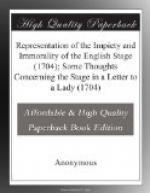The author reveals within his tract some of the reasons for its appearance at that time. He remarks upon the obvious failure of the opponents of the theater to end “the outragious and insufferable Disorders of the stage.” He stresses the brazenness of the players in presenting, soon after the devastating storm of the night of November 26-27, 1703, two plays, ‘Macbeth’ and ‘The Tempest’, “as if they design’d to Mock the Almighty Power of God, who alone commands the Winds and the Seas.” (’Macbeth’ was acted at Drury Lane on Saturday, November 27, as the storm was subsiding, but, because it was advertised in the ‘Daily Courant’ on Friday, November 26, for the following evening, it would appear that, unless the players possessed the even more formidable power of foreseeing the storm, their presentation of ‘Macbeth’ at that time was pure coincidence. No performance of ’The Tempest’ in late November appears in the extant records, but there was probably one at Lincoln’s Inn Fields, which was not regularly advertising its offerings.) The author also emphasizes the propriety, before the approaching Fast Day of January 19, 1704, of noting once more the Impiety of the stage and the desirability of either suppressing it wholly or suspending its operations for a considerable period. Apparently the author hoped to arouse in religious persons a renewed zeal for closing the theaters, for the tract was distributed at the churches as a means of giving it wider circulation among the populace. (’The Critical Works of John Dennis’ [Baltimore, 1939], I, 501, refers to a copy listed in Magga catalogue. No. 563, Item 102, with a note: “19th Janry, Fast Day. This Book was given me at ye Church dore, and was distributed at most Churches.”)
Except for the author’s ingenuity in seizing upon the fortuitous circumstances of the storm, the acting of ‘Macbeth’ and ‘The Tempest’, and the proclamation of the Fast Day (which was ordered partly because of the ravages of the storm), there is nothing greatly original in the work. The author was engaged, in fact, in bringing up to date some of the accusations which earlier controversialists had made. For example, he reviews the indictments of the players in 1699 and 1701 for uttering profane remarks upon the stage, and he culls from several plays and prints the licentious expressions which had resulted in the indictments. Like Jeremy Collier before him and Arthur Bedford in ’The Evil and Danger of Stage-Plays’ later (1706), he adds similar expressions from plays recently acted, as proof, presumably, of the failure of the theaters to reform themselves in spite of the publicity previously given to their shortcomings. In so doing, he damns the stage and plays by excerpts, usually brief ones, containing objectionable phrases. To this material he adds a section consisting of seventeen questions, a not uncommon device, addressed to those who might frequent the playhouses. The questions again stress the great difficulty involved in attending plays and remaining truly good Christians.




